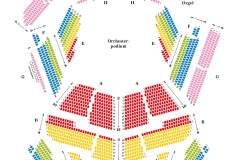Camerata Salzburg
Mo | Tu | We | Th | Fr | Sa | Su |
Since she first heard it at the age of 13, she has loved Johannes Brahms's Piano Concerto in D minor: It was an experience that fundamentally changed her, Hélène Grimaud recently said in an interview. She has recorded the concerto on CD twice already and therefore has a particularly deep connection to this work, which Brahms initially began as a sonata at the age of 21 and later transformed into a large-scale piano concerto that challenged the conventions of its genre. Grimaud is fascinated by the profoundly personal character of the work: "It seems to me as if he wrote it ‘in the first person.’ It feels as though detailed memoirs are laid out before us."
The Frenchwoman, whose international career has now spanned 30 years, values other areas of activity as well: As a human rights activist and author of several novels, she has distinguished herself, with her legendary commitment to endangered wolves being particularly notable. However, for Grimaud, making music remains the medium through which she can express herself most comprehensively.
Program and cast
Camerata Salzburg
Hélène Grimaud, piano
Programme
Wolfgang Amadeus Mozart
Symphony No. 40 in G minor, K. 550
Johannes Brahms
Concerto for Piano and Orchestra No. 1 in D minor, op. 15
Berliner Philharmonie
The Berliner Philharmonie is a concert hall in Berlin, Germany. Home to the Berlin Philharmonic Orchestra, the building is acclaimed for both its acoustics and its architecture.
The Philharmonie lies on the south edge of the city's Tiergarten and just west of the former Berlin Wall, an area that for decades suffered from isolation and drabness but that today offers ideal centrality, greenness, and accessibility. Its cross street and postal address is Herbert-von-Karajan-Straße, named for the orchestra's longest-serving principal conductor. The neighborhood, often dubbed the Kulturforum, can be reached on foot from the Potsdamer Platz station.
Actually a two-venue facility with connecting lobby, the Philharmonie comprises a Großer Saal of 2,440 seats for orchestral concerts and a chamber-music hall, the Kammermusiksaal, of 1,180 seats. Though conceived together, the smaller venue was added only in the 1980s.
By subway (U-Bahn):
Lines U2 (Bahnhöfe Potsdamer Platz or MendelssohnBartholdy-Park)
By city train (S-Bahn):
Lines S1, S2, S25 (Potsdamer Platz)
By regional train:
Lines RE3, RE4, RE5 (Potsdamer Platz)
By bus directly to the Philharmonie:
Lines 200 (Philharmonie), M48, M85 (Kulturforum or Varian-Fry-Straße),
Further bus lines: M29 (Potsdamer Brücke), M41 (Potsdamer Platz)
By car:
A limited number of parking spaces are available on the Philharmonie property. Please use the parking garages under the Sony Center and under the Potsdamer Platz Arkaden (Entrance at Reichpietschufer).
By bycicle:
A limited number of bycicle stands are available on front and behind the Philharmonie. Additional stands can be found in front of the State Library (Staatsbibliothek) across the street.

 EN
EN DE
DE IT
IT FR
FR ES
ES RU
RU JP
JP RO
RO
 Seating plan
Seating plan